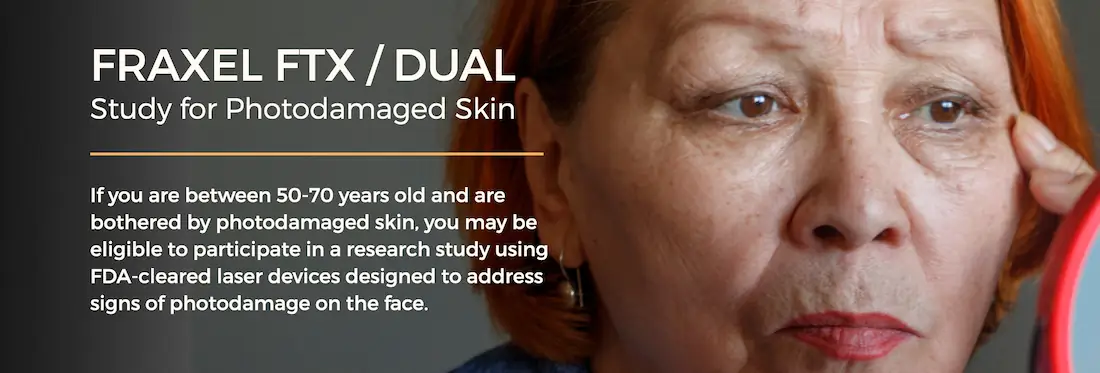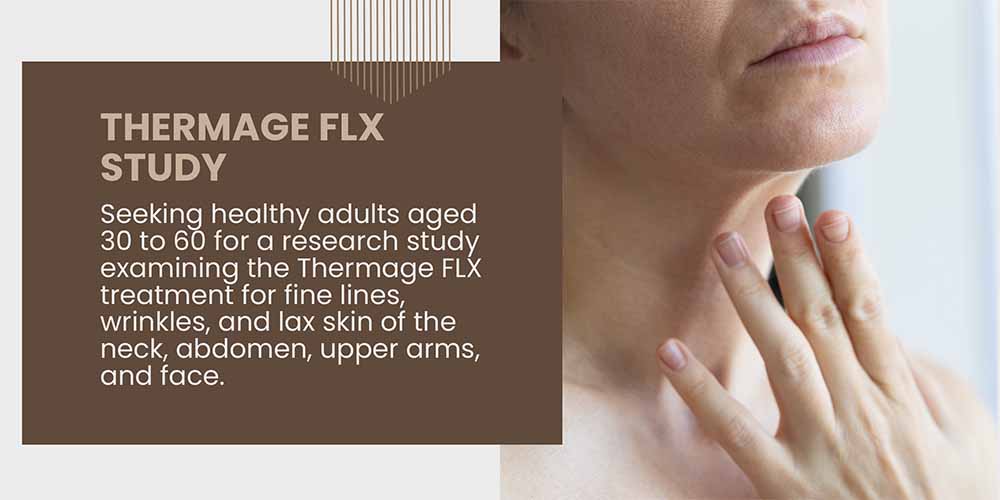Fraxel FTX/FD Study

Seeking adults aged 50 to 70 for a study comparing two laser devices (Fraxel Dual and Fraxel FTX) for the potential treatment of photodamaged skin. Participants will undergo a single split-face laser treatment, with one side of the face treated using Fraxel Dual and the other with Fraxel FTX. The study includes approximately 5 clinic visits over a 4-month period. All participants will return for follow-up visits at 24 hours and 3 days post-treatment. Additional follow-up visits will vary by participant group:
- Subjects 9 & 10 will return at 5 days
- Subjects 11 & 12 at 7 days
- Subjects 13 & 14 at 30 days
- Subjects 15 & 16 at 60 day
During visits, clinical photographs, patient surveys, and skin assessments will be conducted. Participants will also undergo four facial skin biopsies– two before treatment and two after–to evaluate healing and molecular markers of UV damage and repair. All participants will receive pre- and post-treatment care instructions, and eligible individuals will be compensated and receive an optional complimentary laser treatment for cosmetic improvement of the biopsied site if needed
For more information contact the Research Department at
Inclusion Criteria
Participants who meet all the following criteria are eligible for inclusion:
- Male or female.
- 50 to 70 years of age.
- At least Moderate (II) classification on Glogau Photodamage Scale.
- Fitzpatrick skin types I-IV.
- Ability to read, understand, and sign the informed consent form.
- Must agree to avoid application of active ingredients aside from moisturizer and sunscreen during study period (i.e, retinoids, AHA/BHAs).
- Must agree to avoid any injections of neuromodulators or fillers of any kind during the study period.
- Must be able to complete appropriate follow-up with photographs and consent to biopsy as required/agreed upon during the screening process.
- Must be able to perform diligent sun protection during the study period.
- Must agree to the use of clinical photos for medical literature and presentation purposes.
- Participants must agree to seek the advice of their medical doctor regarding any known or suspicious skin condition before laser treatment.
- Any condition or situation that would prevent the participant from safely completing all protocol requirements for participation.
- Subject identified as an appropriate candidate for study treatment based on the principal investigator’s opinion.
Exclusion Criteria
Participants who meet any of the following criteria will be excluded:
- Must not be pregnant, breastfeeding, or planning to become pregnant during the study.
- History of any type of allergic reaction to lidocaine or topical anesthesia.
- Recent and/or active localized or systemic infections.
- Diagnosis/possibility of significant skin conditions within the anticipated treatment area (e.g., untreated skin cancer, active infections, open wounds, rashes, burns) or conditions that may worsen during treatment, such as melasma
- Predisposition to keloid formation or excessive scarring.
- Diagnosis of a condition that may compromise the immune system, such as HIV, lupus, scleroderma, and/or systemic infections.
- Systemic steroids (e.g., prednisone, dexamethasone) should be avoided before and up to 7 days post-treatment.
- Actively taking Immunosuppressive medication or have used within the last 3 months.
- Individuals undergoing Accutane treatment or drugs in a similar class within the last 6 months.
- Prior history of laser resurfacing (ablative or non-ablative) within the last 6 months.
- Having had Botox injections or dermal fillers (such as hyaluronic acid) within the past 3 months or prior dermal filler treatment in the preauricular area within the last 9 months.
- Sunburn and/or recent sun exposure (tan) on the treatment area in the last 6 weeks.
- Has received an investigational drug or had been treated with an investigational device Enrolled in an investigational drug or device study at the time of study entry. However, concurrent participation in observational studies where no investigational treatment is being used will be allowed.
- Has a tattoo in the treatment area which may interfere with treatment in the opinion of the investigator.
- Has excess facial hair in the treatment area that, in the opinion of the investigator, would impact the ability to administer or evaluate the effect of treatment.
Thermage FLX Study

Seeking adults aged 30 to 60 for a study evaluating the Thermage FLX treatment for the potential treatment of fine lines, wrinkles, and lax skin of the neck, abdomen, upper arms, and face. All participants will be receiving a single Thermage FLX treatment. The study includes approximately 4 clinic visits over a 6-month period, including a screening visit, a baseline visit, a third visit after 90 days, and a final visit after 180 days. Clinical photographs, surveys, and assessments will be completed at each visit, and participants will receive pre- and post-treatment care instructions after every study treatment.
For more information contact the Research Department at
713-900-3900 or research@dermlasersurgery.com
Inclusion Criteria
Participants who meet all the following criteria are eligible for inclusion:
- Be an adult female or male, ≥30 – ≤60 years of age.
- Have mild-to-moderate skin laxity of the neck, abdomen, upper arms, and/or face, and/or mild-to-moderate lines and/or wrinkles of the neck and/or face assessed as follows:
- Neck:
- Mild-to-moderate neck skin laxity as defined by a score of 1 to 6 on the 10-point Facial Laxity Rating Scale (scored 0-9)
- Mild-to-moderate neck wrinkles as defined by a score of 1 to 6 on the 10-point Fitzpatrick Wrinkle Scale (scored 0-9)
- Abdomen:
- Mild-to-moderate abdomen skin laxity as defined by a score of 1 or 2 on a 4-point Abdominal Laxity Scale (scored 0-3)
- Upper arms:
- Mild to moderate upper arms skin laxity as defined by grade 2 or 3 on the 5-grade IBSA Inner Upper Arm Laxity Scale
- Face:
- Mild-to-moderate facial skin laxity as defined by a score of 1 to 6 on the 10-point Facial Laxity Rating Scale (scored 0-9)
- Mild-to-moderate facial wrinkles as defined by a score of 1 to 6 on the 10-point Fitzpatrick Wrinkle Scale (scored 0-9)
- Neck:
- Females of childbearing potential must have a negative urine pregnancy test. Females who have experienced menarche and who are not postmenopausal (either confirmed via FSH testing or who have not menstruated for 2 years or more without an alternative medical cause) or surgically sterile will be considered of childbearing potential.
- Females of childbearing potential must agree to use an acceptable method of birth control for the duration of the study. Acceptable methods of birth control are oral and other systemic contraceptives, condoms only, intrauterine device, double-barrier methods, bilateral tubal ligation, partner vasectomy, and abstinence.
- Have no clinically abnormal findings based on the medical history as determined by the study investigator.
- Be able to follow the study instructions, be available on the specific required study visit days, and be willing to complete all study visit procedures and assessments.
- Understand the research nature of this study and sign an informed consent document prior to the performance of any study-specific procedure or assessment.
- Agree to not undergo excluded procedures (i.e., energy-based device treatments, injectables, or plastic surgery) on the study treatment areas for the duration of study.
- Participant has a body mass index (BMI) ≤30.
Exclusion Criteria
Participants who meet any of the following criteria will be excluded:
- Participant is pregnant or breast feeding or trying to become pregnant for 3 months prior to the screening visit or during the study.
- Participant has given birth within 3 months prior to the screening visit.
- Participant has an anticipated need for procedures, surgery, overnight hospitalization, or other events that would prevent the participant from making the required visits during the study.
- Participant has a pacemaker, internal defibrillator, or other implanted electronic device.
- Participant has an implant in the target treatment zone(s).
- Participant has had radiation therapy in the target treatment zone(s).
- Participant has had 1 or more prior cosmetic procedures in the target treatment zone(s) including:
- Thermage or any energy-based device procedure, derm abrasion, or chemical peel on any treatment area within 6 months prior to the screening visit.
- Short-acting neurotoxins within 6 months prior to the screening visit.
- Long-acting neurotoxins within 9 months prior to the screening visit.
- Hyaluronic acid filler ≤1 year prior to the screening visit.
- Semi-permanent or permanent fillers at any time prior to the screening visit.
- Plastic surgery within 1 year prior to the screening visit.
- Participant has excessive subcutaneous fat in the target treatment zone(s).
- Participant has a tattoo anywhere in the target treatment zone(s).
- Participant has an active localized infection in the target treatment zone(s) or an uncontrolled systemic infection.
- Participant has any of the following pre-existing skin conditions in any targeted treatment area: eczema, psoriasis, allergic dermatitis, significant acne, rosacea, or other conditions that may affect treatment.
- Participant whose skin is tanned or sunburned in the target treatment zone(s) at the screening and/or baseline visit may be excluded at the discretion of the investigator.
- Participants with a medical condition that affects collagen production, including Ehlers-Danlos syndrome and scleroderma, will be excluded.
- Participant has diabetes or a history of congestive heart disease.
- Participant has a rheumatologic or autoimmune disease.
- Participant has any condition that results in photosensitivity or is taking any medication containing aminolevulinic acid (e.g., Levulan).
- Participant has any condition, including unusual or expansive skin surface irregularities, that would prevent safe completion of this protocol.
- Participant has used the following medications on the target treatment zone(s) within 2 weeks of the baseline visit: topical retinoid creams or ointments or vitamin creams (A, C, or E, including retinol or other retinoids).
- Participant has used isotretinoin (e.g., Accutane) within 6 months prior to the screening visit.
- Participant has excessive hair the target treatment zone(s) (e.g., a beard or mustache) that they are unwilling to shave.
- Any consideration that, in the investigator’s opinion, makes the participant an unsuitable candidate to receive the study treatment or may interfere with the study results.
- Participant has a history of thyroid or parathyroid abnormalities.
- Participant has an allergy to topical or injectable anesthetics.
- Participant is taking, or has taken within 3 months prior to the screening visit, medication that may cause significant weight loss (for example, injectable or oral weight loss drugs, systemic steroids).
- Participant has a medical condition that can cause significant weight fluctuations (for example, thyroid disorder).
- Participant has a psychiatric illness that is not well-managed and stable per the discretion of the principal investigator/qualified investigator.
- Participant has a BMI > 30. 28. Participant has a history of poor healing or easy scarring (for example, prone to hypertrophic scars or keloids).
- Participant has a history of regular smoking in the last 5 years.
- Participant is using, or has used within the 3 months prior to the screening visit, a prescription anticoagulant/antiplatelet medication that might increase bleeding risk. Over-the-counter medications that increase the risk of bleeding (aspirin, ibuprofen, supplements) should be stopped within 2 weeks before the screening visit.
- Participant has cosmetic piercings in the target treatment zone(s) that could interfere with the safe use of the device.
- Exclusion Criterion for Abdominal Zone Treatment Only:
- Participant has 1 or more abdominal hernias.
- Exclusion Criterion for Neck Zone Treatment Only:
- Participant has carotid artery stenosis or significant atherosclerosis.
- Exclusion Criterion for Face Zone Treatment Only:
- Participants with metallic dental braces or brackets may be excluded at the discretion of the study investigator.
Past clinical trials below:
